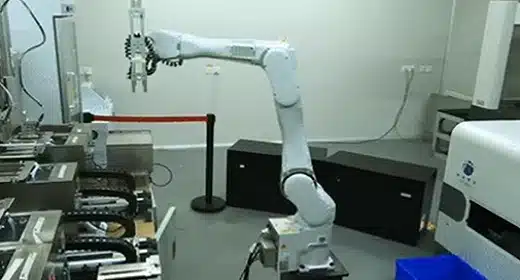by Antonio Regalado: Super-cheap DNA sequencing could boost cancer screening, prenatal tests, and research into population genetics…
 Using technology originally acquired in the US, the Chinese gene giant BGI Group says it will make genome sequencing cheaper than ever, breaking the $100 barrier for the first time.
Using technology originally acquired in the US, the Chinese gene giant BGI Group says it will make genome sequencing cheaper than ever, breaking the $100 barrier for the first time.
The Shenzhen company says the low cost will be possible with an “extreme” DNA sequencing system it plans to offer that is capable of decoding the genomes of 100,000 people a year.
The claim, made today at a DNA technology conference in Marco Island, Florida, could intensify competition between BGI and Illumina, the California firm whose speedy instruments have dominated the gene-sequencing scene for more than a decade.
“I think there is some natural skepticism about whether it’s really for real,” says Stacey Gabriel, director of the genomics platform at the Broad Institute, in Cambridge, Massachusetts. “But if it’s $100, that would be several-fold cheaper. There is a little bit of buzz because there has not been a big sequencing announcement for a couple of years.”
Since the first human genome was decoded in 2003, costs have dropped precipitously. A decade ago, decoding one person’s genome cost around $50,000. Today, the cost (mostly for chemicals) is around $600 for the largest sequencing centers.
To hit an even lower mark, BGI’s new system will employ a robotic arm and a roomful of chemical baths and imaging machines. It will be offered as a custom set-up later this year to big centers involved in mapping the DNA of large populations or in high-throughput cancer research.
“These systems would be prioritized for really large-scale population genetics, million-person projects,” says Rade Drmanac, chief scientific officer of Complete Genomics, a division of BGI Group in San Jose, California, that developed the new technology.
China rivalry
BGI was founded two decades ago during China’s participation in the Human Genome Project. Since then, it has morphed from a research institute that decoded the DNA of pandas and rice plants into a sprawling conglomerate, active in animal cloning, health testing, and contract research.
Though BGI has not announced any customers for the system, known as DNBSEQ-TX, the $100 claim could resurface concerns that the US may have fumbled a technological lead by letting the Chinese firm acquire Complete Genomics in 2012.
Complete was a struggling startup pursuing innovations made by Drmanac, a Serbian émigré with a history of clever ideas for DNA sequencing. But the company needed more investment, and couldn’t yet compete with Illumina, so it accepted BGI’s discount-bin acquisition offer of around $120 million.
At the time, Illumina tried to break up the deal, likening the transaction to selling China the “formula for Coke.” It petitioned the Department of Commerce to block the takeover on national security grounds, citing the risk of a foreign enterprise getting hold of the DNA data of Americans.
The deal, however, went through, despite Illumina’s attempts to “eliminate its closest competitor,” as BGI executives put it.
The two companies continue to thrust and parry with patent lawsuits. Each accuses the other of making use of proprietary technology and, until last week, BGI had not offered to sell its instruments in the US market. It has an existing line-up of four product models, which cost up to $1 million and are sold by a subsidiary called MGI.
How it works
Modern ultra-fast sequencing operates by “synthesis.” That is, a person’s genome is broken into billions of short stretches of DNA and captured on the surface of a chip. Then, fresh DNA chemical letters are added, pairing off along those fragments. The process gradually builds up, or synthesizes, matching strands of genetic information.
By detecting the order that letters are added, the machines determine the sequence of those billions of fragments. The data is then puzzled back together on a computer to produce a full map of a person’s genome.
Using its own version of sequencing-by-synthesis, Illumina introduced a “$1,000 genome” in 2014 and three years later claimed it could eventually lower prices to $100. But it hasn’t done so yet.
The company has been “watching for when we think the time is right,” CEO Francis deSouza told investors last year.
Now BGI may be the one setting prices. In February a Boston startup, Nebula Genomics, began inviting consumers to get sequenced for just $299. The low price of its “personal genome” offer is possible because Nebula ships cheek-swab samples to a BGI lab in Hong Kong to be decoded.
“For the last five years, the cost of genome sequencing has been kept at $1,000. I don’t think that is because of technology stagnation, but because Illumina has a monopoly,” says Dennis Grishin, cofounder of Nebula.
The cost reduction in the BGI system is gained by using a huge, Frisbee-size chip, whose elements are just 500 nanometers apart, and by employing a robotic arm to dunk the chip into chemical baths that can be reused. “We get twice as much DNA on the surface and three times less reagent use because of the dipping,” says Drmanac.
The prototype system doesn’t have a list price because it will be “made to order” only for the largest genetics centers. It will take three full days to complete a run, but will knock off 700 genomes at a time, Drmanac says.
Unlimited sequencing
It’s not certain how much interest there will be for Drmanac’s super-sequencer. According to the Broad Institute’s Gabriel, right now there isn’t either the funding or demand in the US for any one center to sequence 100,000 genomes per year.
That could change, however, as some large initiative takes shape. For instance, a project funded by the National Institutes of Health, All of Us, intends to create a health database containing the sequence of one million Americans volunteers. The UK is already sequencing 500,000 people as part of its own national program.
If genome sequencing gets even cheaper, it could propel the use of new early-detection blood tests for cancer and measurements of people’s microbiomes (their gut bacteria), applications which also rely on high-throughput DNA sequencing. In China, versions of Dramnac’s technology are already being used to perform prenatal tests on millions of women.
“In China there are 20 million newborns per year. Very quickly they will screen every pregnant woman,” he says. “I want to drive this to unlimited sequencing, of billions of people.”
BGI, which uses the slogan “Omics for all” on its website, is sensitive about being viewed primarily as a Chinese operation, which could get it tangled in trade and national security disputes.
But Drmanac says he’s not sorry Complete Genomics was sold to BGI, a company he says thinks long-term and does not take a “short-term Wall Street view.”
“I am a world citizen and a scientist who fights for the growth of science,” he says. “I am really happy we merged with BGI because of their aspiration to bring this technology to everyone. They want to solve the big problems that genomics can do, and the only way is to make it affordable.”









































